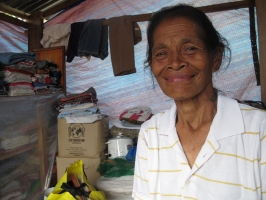
Violeta’s family make a living through fishing squid, but with large numbers of fishing boats damaged, it is now difficult for them to earn any money. Credit: Caritas
By Nick Harrop for Caritas
“I thought I would die the day the typhoon hit, because it was the strongest I have ever known,” said 66-year-old Violeta. “There have been many typhoons before, but not like this one. This is the most extreme typhoon I have ever experienced.” Violeta is sitting in what remains of her home, in the town of Madridejos on Bantayan island in the Philippines. Most of the house has been destroyed by Typhoon Haiyan, but she and her family have managed to rebuild a small part of it.
Today ten people are living in the one remaining room – and it’s hard to believe that all of them can fit in at the same time. “During the typhoon, our whole house was destroyed,” said Violeta. “Our walls collapsed and our roof flew away. I feel so sorry that our house was destroyed. It was very sentimental to me, because my husband was the one who built it. He died in this house in 2006. I feel so hurt, because this house was my only memory of my husband.
“Our house used to be 12 metres by 24 metres. Now we live in a small part that survived. It is 9 metres by 6 metres. We sleep inside together in one small room. There is no choice.” During the typhoon, she and her family took shelter in a neighbour’s house, which was made of concrete. They took only the clothes they were wearing and everything they left behind was destroyed.
“After the typhoon we couldn’t go home, so we went to live in the school,” she said. “We slept in a classroom. We were sleeping on the floor. We stayed there for a week, but then we decided to leave. People wanted to clean up the school so that children could go back. So we decided to leave and rebuild our house as well as we could.” At the moment, the room is covered by a makeshift roof that leaks when it rains. But soon, thanks to Caritas Switzerland, she and her family will start to carry out repairs.
Caritas Switzerland are distributing aid to 570 families in the community during the week. The distribution is peaceful and well organised. A team of volunteers from Caritas’s local partners help to manage the queue, tick people off the list and provide them with 22 items, including rice, canned goods, tarpaulins, buckets, hygiene kits and tools. In total, Caritas Switzerland is supporting 9,000 families on Bantayan and neighbouring islands – some of them only reachable by small fishing boats.
“I’m very thankful to Caritas for helping us,” said Violeta. “Everything they have given us has been useful. They have given us tarpaulin. We’ll use this to cover our roof. At the moment there are holes. When it rains, drops come into the house, so we get wet. We will cover our roof with the tarpaulin. “They also gave us a bucket. We will store some water in their bucket, because we have no other way of storing water. We also received tools, like a saw. We will work on the house with the saw, and there will be no need for us to borrow from other people.
I am very thankful as we can now start to rebuild our house.” Violeta says that the community received aid from another organisation immediately after the typhoon, but that it did more harm than good. Some cars turned up in the community – but they simply threw bags of rice out of the windows, leaving people to fight for whatever they could get hold of. “Everyone ran to the car to get the food. We were very tired and to get the food you had to run fast and get there first.” said Violeta.
“There is a big difference with how Caritas did their distribution. Caritas is very systematic. Even if there are a lot of people waiting, we still know we can get our things and we are very content.” Bantayan Island is famous for producing one million eggs per day, but with many chicken farms damaged by the typhoon, the economy is suffering. Fishing boats have also been damaged, which means many people struggle to earn a living in coastal communities like Madridejos. Violeta’s family make a living through fishing squid, but with large numbers of fishing boats damaged, it is now difficult for them to earn any money.
She hopes for help in earning a living again in the future. “I know that we cannot build the same house again, because we have no source of money. For now we are relying on receiving goods and donations. “In the future, I hope to have more material for us to build our own house and a small income. I would like a small business to support me. I also hope that my children can have good jobs, and that we can find a better place to stay. I get strength from my children. I am trying to stay strong for them. “I am very glad that you are sharing my story with other people and telling them what our lives are like. I am very grateful to all the people who support Caritas operations. I am very thankful to those people who donated. We thank you for what you have given us with all our hearts. We thank you for helping us after Typhoon Yolanda.”
